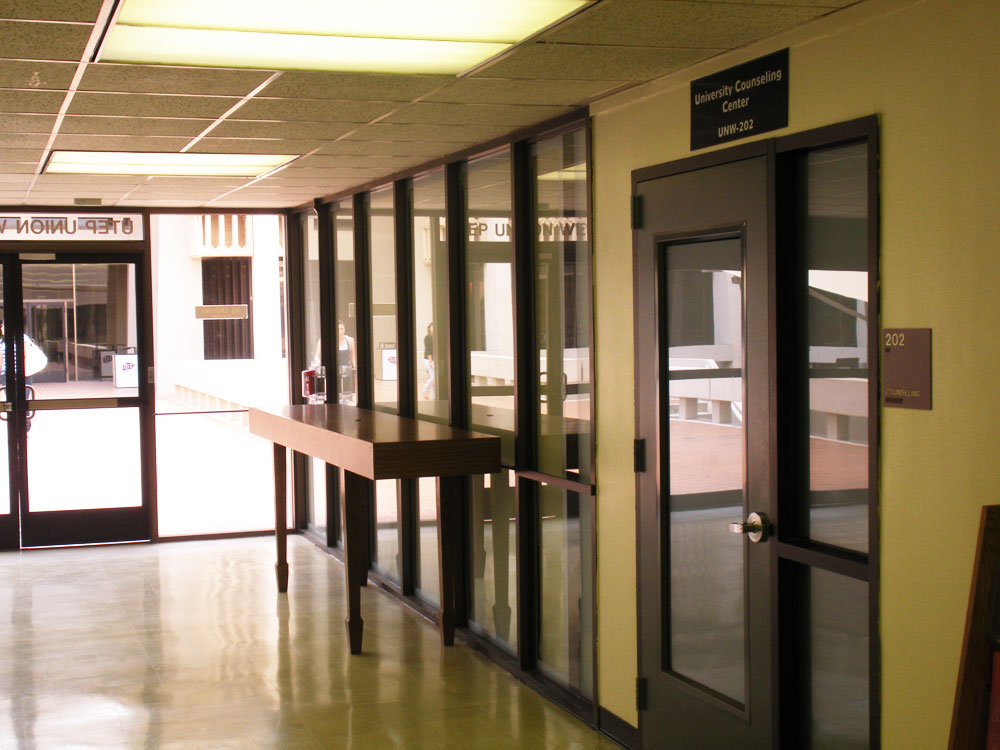EL PASO, Texas – There are little anxieties everyone experiences from day to day: an approaching deadline, an important dinner, or a first impression. Yet when the feeling of being on edge fails to stop, there is high chance you or someone you know might have an anxiety disorder.

Counseling Center at The University of Texas at El Paso (Sofia Aguirre/Borderzine.com)
Anxiety disorders have become, now more than ever, even more prominent in college students. According to the Anxiety Disorders Association of America (ADAA), over the past fifteen years, there has been a steady increase of college students – regardless of gender, age, or ethnicity – seeking help at their campuses for dealing with intense anxiety.
In the context of college, having anxiety could mean decreasing the student’s ability to perform well or effectively in school. Dr. Dawson R. Hancock, department chair and professor of Educational Research at UNC Charlotte, describes in his short paper the many negative effects that test anxiety can have on the psyche of college students, such as decreased test scores, failing to attend or even pass courses.
Ramon Jimenez, a personal counselor at El Paso Community College (EPCC) says these findings are not surprising, “College students of all ages nowadays have so many responsibilities; they go into anxiety mode at school, and then it stays on while they’re working or studying, and they’re stuck in it by the time they get home to their families.”
According to the ADAA, many students with an anxiety disorder (there are more than 6 types of them) might not even recognize they have an illness. Most even feel it’s normal to be tense and worried, attributing it to their workload or inability to manage time as efficiently as a rare few “perfect” students.
Jimenez says that he recommends any student with anxieties, no matter how small, to talk to a counselor at their respective campuses in order to prevent developing an anxiety disorder. “I am here as a counselor,” he says, “because I want to listen. I want them to know they can conquer anything if only they believe in themselves.”
If you or anyone you know is suffering from anxiety, depression, or any mental health issues, you can reach the UTEP Counseling Center at (915) 747-5393 or the EPCC Valle Verde Counseling Department at (915) 831-2642.
Read a study conducted by the ADAA on anxiety in college students.


There is an old saying, “even paranoids can have enemies”. The article is interesting and very well written, but the experts do not demonstrate the kind of thoughtfulness that could help give the story another, and I believe necessary dimension.
If I live in a world that in fact is so random in its violence and haphazard in its rewards that an increase in anxiety is appropriate to the changed demands it imposes, than more anxiety is an appropriate response and appears as a disorder only in relation to a social environment that no longer exists.
In such a new and devolving environment it could be that successful suppression of the rational requirement for increased wariness and attention only appears to be “normal”. In fact such behavior may simply be a manifestation of a studied and questionable indifference to the chaotic reality of the daily life in which these students are required to live.
As we descend into more and more social disorder it may prove more helpful if the psychiatric fraternity attends to changes in behavior which that new and disturbing “society” will require for the survival of individuals. I am not convinced that becoming a frog represent a disorder in tadpoles.
Hi, for your amazing post. You don’t know how this helped me.
Yoga is a gentle form of exercise that has the added
benefit of creating a relaxed, meditative mindset.
Often it stems from fear of the unknown, and sometimes
from a previous bad experience.